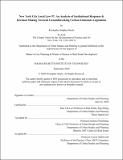New York City local law 97 : an analysis of institutional response & decision making towards groundbreaking carbon emissions legislation
Author(s)
Steele, Kristopher Stephen.
Download1227048894-MIT.pdf (4.712Mb)
Alternative title
Analysis of institutional response & decision making towards groundbreaking carbon emissions legislation
Other Contributors
Massachusetts Institute of Technology. Department of Urban Studies and Planning.
Massachusetts Institute of Technology. Center for Real Estate. Program in Real Estate Development.
Advisor
Siqi Zheng.
Terms of use
Metadata
Show full item recordAbstract
In May 2019, New York City (under Mayor Bill De Blasio) enacted its own version of the Green New Deal called the Climate Mobilization Act, a local law to amend its charter and administrative code to achieve certain reductions in greenhouse gas emissions by 2050. The Act comprises a series of ten bills passed by the New York City Council including a tax on paper bags, a green roof mandate, and a process to close oil and gas plants around the city, amongst others. One major portion of this Act is a bill to limit greenhouse gas emissions, caps, on tens of thousands of buildings in the City. This mandate, called Local Law 97 (LL97), is the first of its kind in any large city in the world. This thesis focuses specifically on LL97, which limits carbon emissions on buildings over 25,000 square feet on real estate product types such as, commercial office spaces, healthcare facilities, residential co-ops, condos, and rental apartment buildings. It examines the characteristics and impacts of the law on real estate owners, as well as the city. It diagnoses how owners are responding to the law and where improvements can be made as this model becomes replicated globally through industry surveys. Since its approval in the Spring of 2019, a number of cities have expressed interest in promulgating similar regulations, though little research analysis has been undertaken to fully evaluate the implications of LL97, whether or not the policy falls short of our goals, or if it's even achievable. It finds and later recommends, that amendments to the law, such as carbon credit portfolio trading, the incorporation of additional asset types, and green leases, amongst others, can help to achieve Local Law 97 goals with enhanced success and mitigated burdens on New York City real estate owners.
Description
Thesis: M.C.P., Massachusetts Institute of Technology, Department of Urban Studies and Planning, September, 2020 Thesis: S.M. in Real Estate Development, Massachusetts Institute of Technology, Program in Real Estate Development in conjunction with the Center for Real Estate, September, 2020 Cataloged from student-submitted PDF of thesis. Includes bibliographical references (pages 98-102).
Date issued
2020Department
Massachusetts Institute of Technology. Department of Urban Studies and Planning; Massachusetts Institute of Technology. Center for Real EstatePublisher
Massachusetts Institute of Technology
Keywords
Urban Studies and Planning., Center for Real Estate. Program in Real Estate Development.